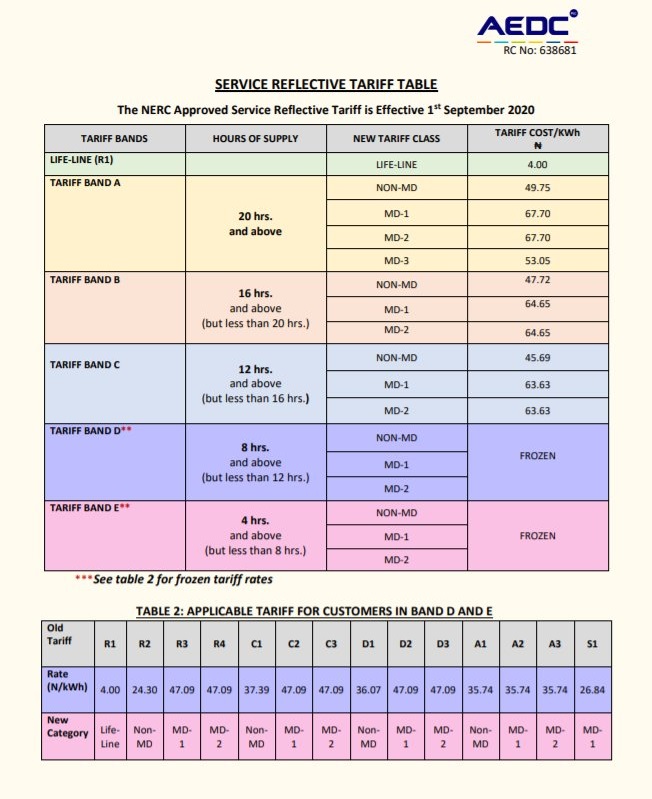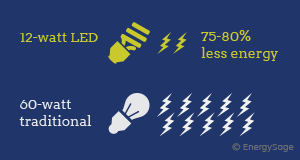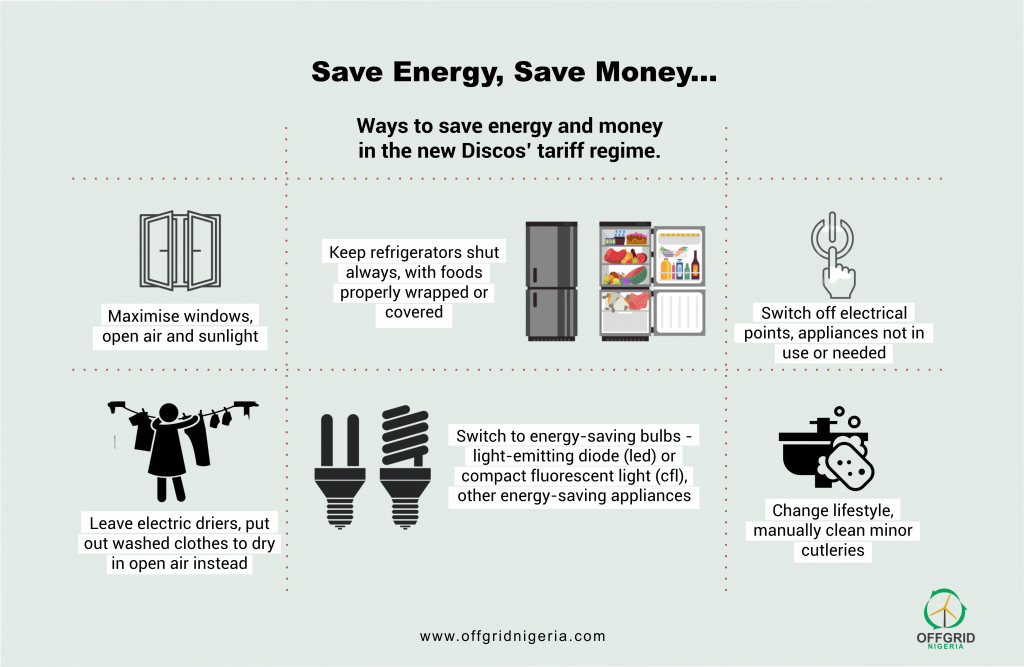Electricity distribution companies (Discos) in Nigeria recently began to apply new retail rates in their supply of electricity to consumers across the country; the new rates are higher than what they were by an average of 43 per cent and will be charged to five newly re-classified distinct consumer categories.
Approved by the regulatory body – the Nigerian Electricity Regulatory Commission (NERC), the tariffs are expected to be tied to the level of service delivery by the Disco; they are dominated by daily hours of supply, either higher or less.

They are also expected to be tied to the level of service interruptions and fault response time and will through the five distinct tariff bands, specify how much homes, offices, businesses and industries will pay to the Discos every billing cycle.
In the new tariff classification, the NERC indicated that Band A is for electricity customers who get a minimum of 20 hours of supply daily; B-band is for customers who receive service for a minimum of 16 hours daily; while C-band includes customers who enjoy electricity up to a minimum of 12 hours daily; Band D customers are those who enjoy a minimum supply of 8 hours daily, and E-band has customers who only get between 4 and 8 hours daily.
From this categorisation, electricity users in Abuja, Kogi, Niger and Nasarawa, who are serviced by the Abuja Disco, and fall under Band A will pay new rates in the form of N49.75, N53.05 and N67.70 per kilowatt hour (kwh) for 20 hours of electricity supplied to them. Clearly, this means that consumers who enjoy more hours of service will have to pay higher prices.
This, however has gotten some hard knocks from key stakeholders – the labour union in Nigeria, manufacturers and trade groups, who claim that some severe economic downturn and impoverishment could result from the hike. President Muhammed Buhari, according to the NERC has nonetheless asked the Discos to provide more meters to Nigerians who do not yet have, to enable them to efficiently manage their consumption.
But there is a way to cope…energy efficiency
While the Discos sort out pending issues halting mass meter rollout, electricity consumers in Nigeria would still have to pay the new rates but could fall back to efficient energy consumption to weather the storm from the rates.
Simply defined by the Environmental and Energy Study Institute (EESI) which was founded by a bipartisan group of members of the US Congress in 1984, energy efficiency means using less energy to perform the same task.
It equally means eliminating energy waste to accomplish a variety of benefits such as reducing greenhouse gas emissions, reducing demand for energy imports, and lowering costs on a household and economy-wide level which is chiefly the case with the new Discos’ tariffs.
Renewable energy technologies are often generally accepted as sources of reducing greenhouse gas emission and lowering costs; however, it is also acknowledged that improving energy efficiency practices is amongst the cheapest and most immediate ways of reducing the use of fossil fuels to generate electricity and saving costs.
The EESI even notes that there are enormous opportunities for energy efficiency improvements in every sector of national economies, vis-à-vis homes and buildings, industry and office operations.

For example, minor adjustments such as choosing light-emitting diode (LED) or compact fluorescent light (CFL) bulbs and energy efficient appliances could help homes and offices reduce their energy usage and costs, thereby cutting down their monthly payments to the Discos. This is even more beneficial to metered consumers.
Powering down appliances when not in use at homes and offices is another great way to efficiently use energy and cut down the monthly bills paid to Discos; this is even more applicable to homes and offices with excessive outdoor lightings which are often left powered at odd times. The ‘security lights’ on outdoor walls of homes and offices are one of such points to consider in that they are habitually powered on at odd hours.
Reducing leaks; yes, electricity leaks from broken systems or infrastructure, as well as poorly wired homes and offices do not only constitute threats to human safety and lives but also affect monthly bills and pockets of electricity consumers. Therefore, consumers should close up possible leaks in their homes and offices now that tariffs are up.
Just like turning off electronics and lighting points when not in use, electricity consumers in Nigeria can reduce their energy consumption and payments to Discos when they turn off the fan when leaving a room considering that fans do not cool a room but only blow air to the human body. As a matter of fact, the motor on the fan is reported to generate heat in the room.
Curtains and drapes could also be closed during the day to keep the sunlight out and rooms cooler, or windows opened during cooler days; that way you save from using the air conditioner less.
At homes or offices with refrigerating sets, foods could be wrapped or covered when placing them in there; the compressors of refrigerating sets are known to work harder using more energy to keep unwrapped foods cool as they release moisture. Making sure that refrigerator’s doors are always shut will also save you energy and money.

To cope with Nigeria’s new electricity tariff raise and reduce energy consumption and monthly payments to Discos in homes and offices now, Nigerians really do not need to do so much but to adopt simple energy saving tasks, such as turning off lighting points or appliances when not in need and using energy-consuming appliances less by manually performing household tasks – hang-drying of clothes in open air and washing dishes by hand. Doing these simple tasks on a day-to-day basis will help electricity consumers cope with the new NERC-approved tariff raise.





